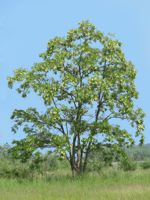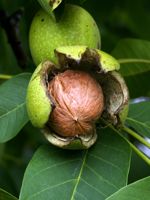Mon-Fri 9am - 5pm Mountain time
Black Locust vs Carpathian English Walnut
Robinia pseudoacacia
Juglans regia Carpathian
SOLD OUT
NOT AVAILABLE THIS SEASON - MIGHT RETURN
Black Locust is an attractive tree. Its distinctive leaves are made of about a dozen bright green leaflets. It also notable for its fragrant white flowers, which smell of citrus.
Black Locust can grow in many situations, but prefers dry areas with lots of sun. It is robust and is an excellent choice for establishing shade in dry, open areas.
Important note: Much of the Black Locust is toxic to humans and livestock, including seeds, bark, and leaves.
Carpathian English Walnut is a great shade tree or a fantastic addition to a food garden. The taste is described as having a full flavour with a hint of sweetness and butterscotch. They are great for fresh eating, cooking, and baking. Thin shelled nuts split right down the center, making them easy to crack. Harvest ranges from late September to early October.
It is known for being highly productive and more cold hardy than other English Walnut varieties.
Carpathian English Walnut is considered to be self pollinating but planting with a second variety will result in greater yields. It can be cross pollinated with Black Walnut and others.

